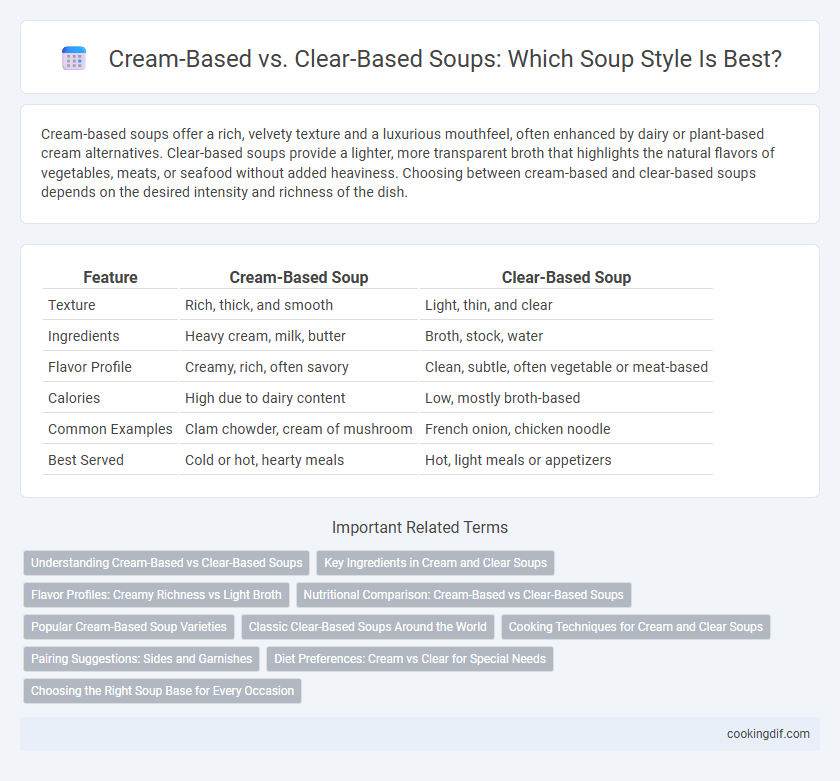Cream-based soups offer a rich, velvety texture and a luxurious mouthfeel, often enhanced by dairy or plant-based cream alternatives. Clear-based soups provide a lighter, more transparent broth that highlights the natural flavors of vegetables, meats, or seafood without added heaviness. Choosing between cream-based and clear-based soups depends on the desired intensity and richness of the dish.
Table of Comparison
| Feature | Cream-Based Soup | Clear-Based Soup |
|---|---|---|
| Texture | Rich, thick, and smooth | Light, thin, and clear |
| Ingredients | Heavy cream, milk, butter | Broth, stock, water |
| Flavor Profile | Creamy, rich, often savory | Clean, subtle, often vegetable or meat-based |
| Calories | High due to dairy content | Low, mostly broth-based |
| Common Examples | Clam chowder, cream of mushroom | French onion, chicken noodle |
| Best Served | Cold or hot, hearty meals | Hot, light meals or appetizers |
Understanding Cream-Based vs Clear-Based Soups
Cream-based soups feature a rich, velvety texture achieved by incorporating dairy such as heavy cream, milk, or roux, creating a thicker consistency and a luxurious mouthfeel. Clear-based soups, like consomme or broth, emphasize clarity and lightness, made by simmering meat, vegetables, or herbs to extract pure, transparent flavors without added thickening agents. Understanding the distinction between cream-based and clear-based soups helps in selecting appropriate soup styles for dietary preferences, cooking methods, and desired flavor intensity.
Key Ingredients in Cream and Clear Soups
Cream-based soups rely heavily on dairy ingredients such as heavy cream, milk, and butter, which create a rich, smooth texture and a velvety mouthfeel. Clear-based soups, like broths and consommes, emphasize key ingredients including well-simmered bones, vegetables, and aromatic herbs that deliver a light, flavorful, and transparent liquid. The choice between cream and clear bases affects the soup's depth, consistency, and nutritional profile, with cream-based soups offering higher fat content and clear-based soups being lower in calories and easier to digest.
Flavor Profiles: Creamy Richness vs Light Broth
Cream-based soups deliver a velvety, rich flavor profile characterized by smooth textures and indulgent creaminess that enhances ingredients like mushrooms or seafood. Clear-based soups offer a delicate, light broth that highlights the natural essence of vegetables, herbs, and meats without overpowering subtleties. The choice between creamy richness and light broth influences the overall taste intensity and mouthfeel, catering to diverse palate preferences.
Nutritional Comparison: Cream-Based vs Clear-Based Soups
Cream-based soups typically contain higher calories, fats, and carbohydrates due to ingredients like heavy cream and butter, providing more energy but increased saturated fat. Clear-based soups, such as broths and consommes, are lower in calories and fat while offering hydration and essential minerals from simmered vegetables, bones, or meats. Choosing clear-based soups supports weight management and heart health, whereas cream-based options may deliver richer flavors and higher protein in moderation.
Popular Cream-Based Soup Varieties
Popular cream-based soup varieties include creamy tomato bisque, rich clam chowder, and velvety potato leek soup, known for their smooth texture and hearty flavors. These soups utilize dairy or non-dairy cream to create a luscious mouthfeel, often complemented by pureed vegetables or seafood. Cream-based soups offer a comforting and indulgent option compared to the lighter, broth-focused clear-based soups.
Classic Clear-Based Soups Around the World
Classic clear-based soups such as French consomme, Japanese miso soup, and Italian brodo offer a light, flavorful foundation that highlights the purity of ingredients. These soups emphasize clarity and subtlety, often prepared by meticulously straining stocks to achieve a transparent, refined broth. Clear-based soups are celebrated worldwide for their delicate taste and versatility, serving as a base for countless traditional recipes.
Cooking Techniques for Cream and Clear Soups
Cream-based soups require techniques such as making a roux with butter and flour to create a smooth, thickened base, often enhanced by slowly incorporating dairy like cream or milk to maintain a velvety texture. Clear-based soups, including broths and consommes, rely on careful simmering and skimming to achieve clarity and depth of flavor, using ingredients like bones, vegetables, and aromatics cooked gently over low heat for extended periods. Precision in temperature control and timing is crucial for clear soups to prevent cloudiness, while cream soups demand constant stirring to avoid curdling and ensure a silky finish.
Pairing Suggestions: Sides and Garnishes
Cream-based soups, rich and velvety, pair exceptionally well with crusty breads, garlic croutons, and fresh herbs like chives or parsley to enhance their smooth texture and mild flavors. Clear-based soups, such as broths or consommes, complement light, crisp sides like garden salads, vegetable sticks, or delicate seafood garnishes like shrimp or scallions, adding brightness without overpowering the delicate broth. Both styles benefit from textural contrasts and fresh, subtle accompaniments that elevate the overall dining experience.
Diet Preferences: Cream vs Clear for Special Needs
Cream-based soups provide a rich source of healthy fats and calories, making them suitable for individuals needing high-energy diets or those with nutrient absorption challenges. Clear-based soups, being low in fat and calories, are ideal for weight management, low-sodium diets, and digestive sensitivities. Both styles can be adapted with specific ingredients to support diabetic, low-cholesterol, or gluten-free dietary requirements.
Choosing the Right Soup Base for Every Occasion
Cream-based soups offer rich, velvety textures ideal for comforting meals and elegant dining, featuring ingredients like heavy cream, butter, and pureed vegetables. Clear-based soups, including broths and consommes, provide light, flavorful options perfect for cleansing the palate or serving as starters, emphasizing clarity and subtle seasoning. Selecting the right soup base depends on the occasion's formality, desired mouthfeel, and ingredient compatibility to enhance the overall dining experience.
Cream-based vs Clear-based for soup style Infographic

 cookingdif.com
cookingdif.com